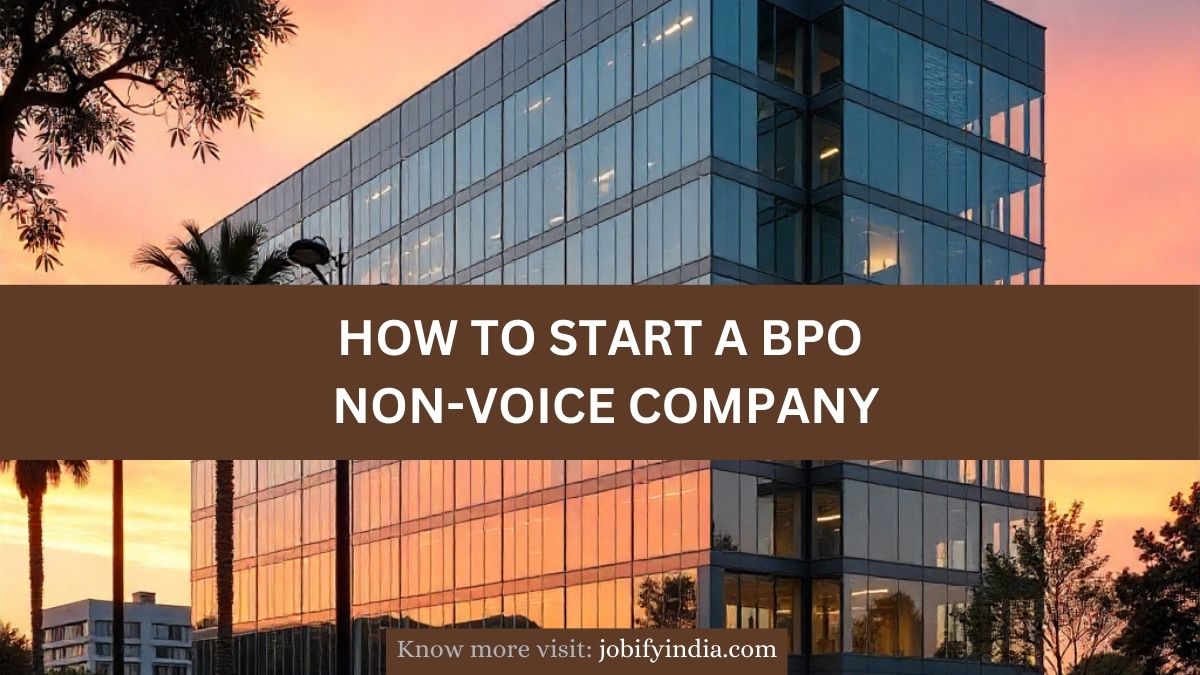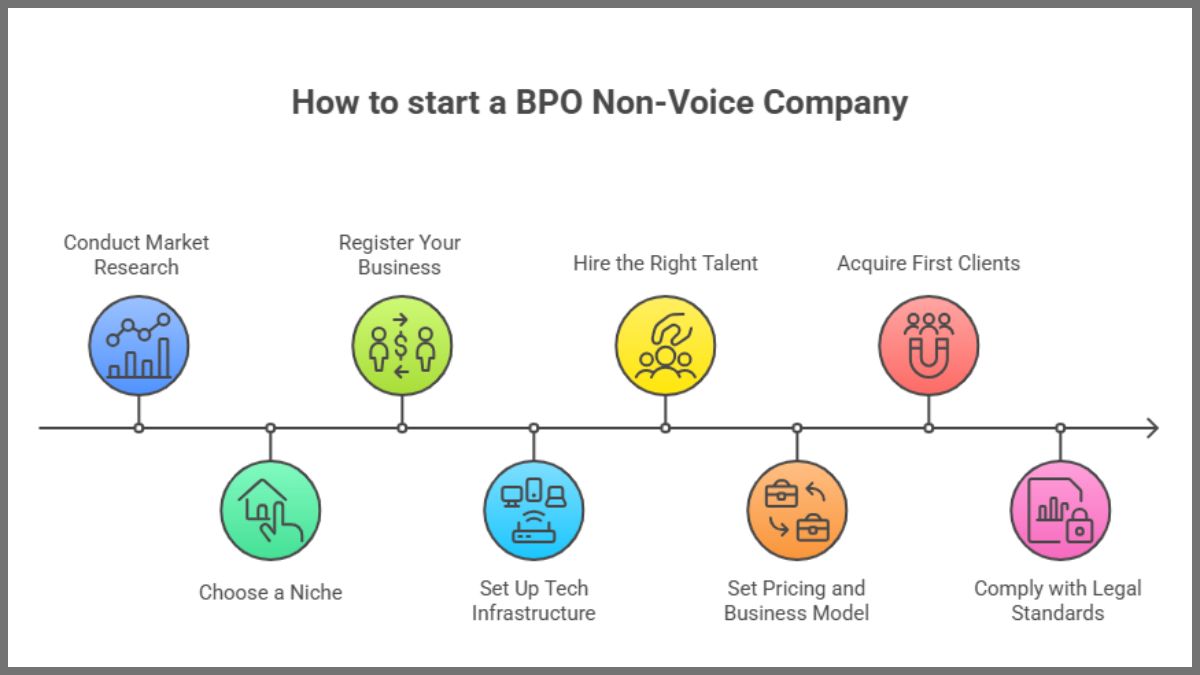In today’s digital-driven world, starting a BPO (Business Process Outsourcing) non-voice company can be a smart and profitable move. As businesses around the globe look to reduce costs and improve efficiency, the demand for non-voice outsourcing services is growing fast. But here’s the catch—starting a BPO company isn’t just about having computers and hiring a few employees. It requires planning, strategy, and a deep understanding of the market.
So, if you’re asking yourself, “How do I start a BPO non-voice company?”—you’ve come to the right place. This blog will guide you step-by-step, using simple language, actionable tips, and the latest trends in the outsourcing industry.
Let’s get started!
What is a BPO Non-Voice Company?
Before diving into the “how,” let’s clarify the “what.”
A non-voice BPO company offers back-end support services that don’t require verbal communication with customers. These tasks usually happen via email, chat, or specialized software platforms. Common non-voice services include:
- Data entry
- Email support
- Chat support
- Content moderation
- Market research
- Accounting and bookkeeping
These services are often repetitive, process-driven tasks that companies prefer to outsource, especially to cut costs and focus on core operations.
Why Start a Non-Voice BPO Company in 2025?
You might be wondering—why now? The truth is, there’s never been a better time.
According to Grand View Research, the global BPO market size reached USD 260 billion in 2023 and is expected to grow at a compound annual rate (CAGR) of over 9.4% from 2025 to 2030. Non-voice segments are especially gaining popularity due to the rise in e-commerce, fintech, and remote work culture.
Here are a few reasons why starting a BPO company makes sense today:
- Cost-effectiveness: More businesses are outsourcing to reduce operational costs, especially post-pandemic.
- Remote adaptability: Non-voice tasks are perfect for remote teams, giving you flexibility without big office investments.
- Demand for support services: The demand for 24/7 support via email and chat is skyrocketing.
Step-by-Step Guide to Starting a BPO Non-Voice Company
Now let’s walk you through the steps you need to take if you’re serious about launching your own non-voice BPO company.
1. Do Your Market Research
Before anything else, understand what services are in demand. Are you better off offering data entry or live chat support? Who is your target client—small businesses, e-commerce companies, or fintech startups?
Tip: Tools like Google Trends and LinkedIn can help you spot what businesses are currently outsourcing.
2. Choose a Niche
Don’t try to be everything to everyone. Instead, pick a niche where you can specialize. For example:
- E-commerce email support
- Healthcare data entry
- Tech industry chat solutions
Specializing makes it easier to build a brand and streamline operations.
3. Register Your Business
Every legitimate business begins with proper registration. This includes:
- Choosing a business structure (LLC, Corporation, etc.)
- Registering your business name
- Applying for tax IDs and necessary permits
If you’re starting in the Philippines or India, check local guidelines such as SEC registration (Philippines) or ROC registration (India).
You can also refer to this guide on how to start a BPO company for insights on business registration, permits, and compliance requirements.
4. Set Up Your Tech and Infrastructure
Non-voice BPOs are tech-driven. You don’t need a physical office from day one, but you do need the right tools to ensure seamless service. At a minimum, you’ll need:
- Laptops/Desktops with reliable specs
- High-speed internet connection
- Project management tools
- Time-tracking and CRM tools (HubSpot, Time Doctor)
Also, invest in security software. Clients care a lot about data privacy.
5. Hire the Right Talent
Your people are your biggest asset. Hire individuals who are:
- Fluent in written English
- Detail-oriented
- Comfortable with using tools like Excel, Zendesk, or Slack
Training also plays a huge role. Clients trust BPOs that offer well-trained and consistent talent.
6. Set Pricing and Create a Business Model
Figure out how you’ll make money. Will you charge hourly rates? Project-based fees? Monthly retainers?
To stay competitive, check what others are charging in your niche. Websites like Upwork or Clutch.co are great for that. But remember—cheapest isn’t always best. Focus on offering quality and reliability.
7. Get Your First Clients
This might seem like the hardest part but don’t worry. Getting your first client is all about building trust and showing value.
Here are a few strategies:
- Reach out through LinkedIn and freelancing platforms
- Create a website outlining your services and client benefits
- Offer trial periods or discounts to new clients
- Ask for testimonials and referrals
And don’t underestimate the power of networking. Join BPO forums, startup groups, and tech events—online or offline.
8. Comply with Legal & Data Security Standards
Whether you’re handling customer addresses or payment info, data protection is key. Make sure to:
- Sign NDAs with clients and employees
- Follow GDPR or relevant data privacy laws
- Implement secure data storage and access protocols
This is especially important if you want to work with overseas clients.
What Are Some Recent Trends to Keep in Mind?
To stay ahead of the curve, keep your eyes on the latest in outsourcing:
- AI Integration: Tools like ChatGPT or automated data processors are now being used to boost productivity.
- Hybrid models: Many BPOs are switching to a mix of voice and non-voice services to offer more flexibility to clients.
- Cloud Operations: More companies are shifting from local software to cloud platforms like AWS and Google Workspace for improved collaboration and security.
- Focus on Customer Experience (CX): It’s no longer just about handling queries, but also about creating delightful brand experiences.
Wrapping It Up
Starting a BPO non-voice company may seem complex at first, but with a clear roadmap, it’s entirely doable. From understanding your niche to building a competent team and focusing on technology, every step plays a part in your long-term success.
Just remember, it’s not always about growing fast—it’s about growing right.
Are you ready to take the leap into the world of BPO?
With careful planning, a reliable team, and a commitment to quality, your dream BPO non-voice company could be the next big success story.
Got questions about building your BPO business? Drop them in the comments below—we’d love to help!





